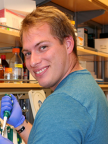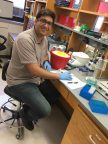Students Supported by the T-32 Training Grant
current t-32 training grant
CURRENT POSITION: Postdoctoral Fellow, Vanderbilt University
Defended Dissertation from the Weiss Lab on 3/8/2022
Ph.D. Awarded: March 2022
BS and BMdS, West Virginia University (2018)
Graduate Student, Richmond Laboratory
BS, Vanderbilt University
I grew up in Colorado and moved to Nashville to attend Vanderbilt University for my undergraduate studies in Molecular/Cellular Biology. I’m currently a graduate student in Dr. Ann Richmond’s lab. My research is focused on the development of novel combination therapies that will make triple negative breast tumors more responsive to immunotherapies. My research also involves the development of patient-derived organoid models that allow for efficient testing of drug combinations, and I’m interested in developing better model systems that will allow pre-clinical findings to have more relevance to clinical applications.
Graduate Student, Ferrell Laboratory
BS, Lee University (2016)
I grew up in Soddy-Daisy, TN and attended Lee University, where I graduated with a degree in Health Science and conducted clinical research on NCAA Division II athletes. After graduation, I spent a year working for Colleen Niswender in the Vanderbilt (now Warren) Center for Neuroscience Drug Discovery. I completed my IGP year in 2019 and joined the Ferrell lab, where I am studying the role of the DNA demethylase Tet2 in inflammation and myeloid malignancy.
Graduate Student, Winder and Conn Laboratories
BS, Rider University (2017)
Graduate Student, Penn Laboratory
BS, Iowa State University (2019)
I grew up in Hawthorn Woods, Illinois, and I earned my BS in Genetics from Iowa State University in 2019. I began in Vanderbilt’s Interdisciplinary Graduate Program in Fall 2019, subsequently joining the Pharmacology Graduate Program and Dr. John Penn’s laboratory. In my thesis work, I study the contribution of prostanoids to retinal inflammation and the therapeutic potential of prostanoid receptor antagonists in early-stage diabetic retinopathy.
previous t-32 training grant
CURRENT POSITION: Consultant, Boston Consulting Group (BCG)
Defended Dissertation from the Konradi Laboratory on 3/23/20
BA, Princeton University (2011)
Defended Dissertation from the Bachmann Laboratory on 5/20/22
BS, James Madison University (2015)
CURRENT POSITION: Senior Scientist, Sosei Heptares
Defended Dissertation from the Meiler Laboratory on 11/01/2018
Ph.D. Awarded: November 2018
BA, Colgate University (2011)
CURRENT POSITION: Analyst, Proactive Worldwide
Defended Dissertation from the Grueter Laboratory on 12/17/2021
Ph.D. Awarded: January 2022
BS, Virginia Polytechnic Institute (2015)
CURRENT POSITION: Postdoctoral Researcher, Vanderbilt University
Defended Dissertation from the Zhang Laboratory on 06/29/2018
Ph.D. Awarded: July 2018
BS, Rhodes College (2011)
CURRENT POSITION: Chemist, U.S. Department of Labor
MS, Vanderbilt University, Hudson Laboratory (2019)
BS, York College of Pennsylvania (2015)
CURRENT POSITION: Postdoctoral Research Associate, University of California, San Francisco
Defended Dissertation from the Denton Laboratory on 10/12/2020
BS, University of Arizona (2014)
Defended Dissertation from the Niswender Laboratory on 10/15/2020
Ph.D. Awarded: October 2020
BS, Miami University (2014)
Graduate Student, Arinze laboratory (Meharry Medical College Student)
BS, Univ. of Nevada, Las Vegas (2006)
CURRENT POSITION: Postdoctoral Research Associate, Yale University
BA, Vanderbilt University (2013)
Defended Dissertation from the Patel Laboratory on 1/07/2020
CURRENT POSITION: Senior Research Investigator, Bristol Myers Squibb
Ph.D. Awarded: February 2019
Defended Dissertation from the Osheroff Laboratory on 1/25/2019
Pharm.D., Lipscomb University (2014)
BA, Reinhardt College (2010)
Graduate Student, Wang laboratory (Meharry Medical College Student)
BS, Murray State Univ. (2013)
CURRENT POSITION: Assistant Professor
Defended Dissertation from the Schoenecker Lab on 11/9/2018
Ph.D. Awarded: December 2018
BS, Ohio Northern University (2003)
MD/PhD Candidate, Vanderbilt University Medical Center
MS, University of Connecticut (2011)
BS, University of Connecticut (2010)
Defended Dissertation from the Winder laboratory on 3/24/2020
Ph.D. Awarded: March 2020
BS, York College of Pennsylvania (2013)
CURRENT POSITION: Postdoctoral Fellow, Columbia University Irving Medical Center
Defended Dissertation from the Iverson laboratory on 3/4/2019
Ph.D. Awarded: March 2019
BS and BA, Wittenburg University (2014)
Defended Dissertation from the Hasty laboratory on 2/28/2019
Ph.D. Awarded: March 2019
BS, University of Richmond (2013)
Defended Dissertation from the Hohman Laboratory on 3/14/22
BSLAS, University of Illinois @ Urbana (2015)
CURRENT POSITION: Postdoctoral Research Fellow, Vanderbilt University
Defended Dissertation from the N. Brown laboratory on 2/26/2018
Ph.D. Awarded: March 2018
MS, Northern Arizona University (2012)
BS, University of Arizona (2009)
CURRENT POSITION: Research Instructor of Pharmacology, Vanderbilt University
Defending Dissertation from the Weaver laboratory on 10/30/2020
Ph.D. Awarded: November 2020
Pharm.D., Lipscomb University(2016)
Graduate Student, Hadjfrangiskou laboratory
BS, Florida State University (2014)
My research is driven by an interest in antibiotics, infectious diseases, and cellular signaling. My thesis work focuses on understanding the signaling networks that Uropathogenic E. coli use throughout pathogenesis to acquire vital nutrients, respond to hazards, and to regulate virulence factors, with an overarching goal to develop new antimicrobial therapies targeting these systems.
Graduate Student, Wang laboratory
BS, Texas Southern University (2012)
The primary goal of the Wang lab is to identify mechanisms of therapeutic resistance and to translate this knowledge into transformative and effective treatments for a variety of cancers. My cancer of interest, glioblastoma multiforme (GBM), is the most malignant form of primary brain cancer with a patient life expectancy of only 12-15 months. Knowing this, my long term goal is to identify novel combination therapies that suppress or inhibit the ability of GBM tumors to self-renew, proliferate rapidly, and resistant chemo-radiation.
Graduate Student, Arinze laboratory (Meharry Medical College Student)
BS, Howard University (2002)
CURRENT POSITION: Postdoctoral Fellow, Icahn School of Medicine at Mount Sinai
Defended Dissertation from the Hamm Laboratory 11/08/20107
BS, University of California, San Diego (2010)


























